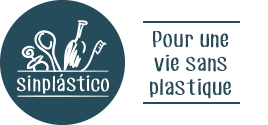How can we take action to save the ocean?
Saving and preserving the ocean starts with a simple idea: we just need to reject single-use plastic.
Ideally, the aim is of course to reduce global plastic production and consumption. But this is a very long process, and probably one reserved for professionals and politicians.
If we mobilise to reject single-use plastic (splastic bags, bottles, glasses, cups, plates, cutlery, takeaway containers, etc.), this will affect 50% of the world’s plastic production.
Don’t know where to buy plastic-free products? Try Sin Plastico, we’re fans.
Every one of us can become an agent for change and contribute to protecting our common good.
Say no to straws
If you think about it, you’ll realise that you’re given a straw whenever you order a cold drink.
Why is it easy to go without? Because you just need to say “No straw, please”. The hardest part is remembering to do it. But once you understand that there are straws everywhere, you end up remembering.
Why is it a game-changer? Because straws always end up in the ocean. If you have a strong stomach, you can watch what happens to them.
Want to take concrete action? Sign the petition to have plastic straws banned!
Say no to disposable plastic bags
Don’t use disposable plastic bags, it’s really very easy. Just put your re-usable bag (made of cloth, plastic or synthetic material for example) in your bag, handbag or satchel.
Why is it easy to go without? Because re-usable bags are everywhere and once you have one, you take it with you wherever you go.
Why is it a game-changer? Because it’s one less plastic bag in the environment. The equivalent of 4 billion of them enter the ocean every day…
IMPORTANT: here’s why paper bags are not a good idea either.
![]() Paper bags emit methane
Paper bags emit methane
When paper bags ferment (at landfill sites for example), they emit methane, which is 23 times more powerful than CO2 in terms of global warming potential (47).
![]() Paper bags take up space
Paper bags take up space
Paper bags are bulkier, so more pallets and trucks are needed to transport them than their plastic counterparts.
![]() Paper bags are made of water and wood
Paper bags are made of water and wood
The process of making paper bags needs water and wood to make the paste. Not really ideal as things stand.
Avoid using plastic bottles
Plastic bottles are handy but they take 400 years to disappear out of sight and they actually never do disappear since plastic gets everywhere in qnother form… They are a real scourge, firmly rooted in our lifestyles.
Why is it easy to go without? Because tap water, which you can filter if you like, is readily available. You can even carbonate it. Then you just need to fill your glass bottle for use at home, or your flasks for when you’re out and about.
Why is it a game-changer? Because on a worldwide scale, we use 480 billion plastic bottles a year… (9) And recycling? It only affects a tiny fraction of this figure and does not produce new bottles. And by the way, recycling and deposit-return systems are the new great ideas of bottle manufacturers that actively look for ways not to limit production…
Don’t throw your cigarette butts on the ground
An estimated 4.95 billion cigarette butts are discarded in the environment each year (that’s 4,950,000,000,000 cigarette butts!) (50). And, surprisingly, cigarette filters contain cellulose acetate and therefore plastic. Due to their composition and the residue of the substances contained in cigarettes, cigarette butts are a kind of Molotov cocktail for the various ecosystems.
Why is it easy to avoid throwing them on the ground? Because you just have to put them out and throw them in a bin! Watch this really funny ad if you need convincing!
Why is it a game-changer? Because a discarded cigarette butt has every chance of ending up in the ocean via the sewers, where it will pollute 500 litres of water and take 2 years to disappear (51).
Go without cling film
Cellophane-style cling film may be handy but it’s not recyclable: it’s too thin and is often dirty.
Why is it easy to go without? Because you just need a cloth to cover your dishes in the refrigerator. There are even waxed cloths that will fit your dishes perfectly. And to carry your sandwiches? Now there are washable, adjustable bags that work very well.
Why is it a game-changer? Cling film is thrown away after every use and accumulates at landfill sites or incinerators. When you go without it, you’ll avoid throwing away all that plastic.
Give up balloons
Balloons, especially balloon releases, are a real time bomb for the environment and animals.
Why is it easy to go without them? Because the fun that balloons give to children is fleeting, and it’s easy to explain to them why nature can’t handle them.
Why is it a game-changer? Because balloons are not recyclable and continue to pollute for years. And because balloons symbolically released into the sky very often end up in the ocean, where they are ingested by marine animals, which then die.
(for the boldest) Clean up the environment
When you first think about tidying a beach, mountain or river, it seems silly. And when you try it, you love it. Because it’s really rewarding to do something concrete and effective. And what’s more, if you get children to do it, you’ll see how proud they feel.
Why is it easy to do? Because you just have to pick up a bin bag and bend down: there are things to pick up everywhere. And what’s more, it’s contagious: maybe others will have joined you after 10 minutes.
Why is it a game-changer? It’s a game-changer because it’s a really practical step, with concrete effects, and you become an agent for change.
(for the boldest) Stop eating fish
Eating less fish, or no fish at all, is not easy or feasible for everyone. But there is a good chance that it is possible for those of you reading this, mostly because, for the most part, our protein intake does not depend on fish.
Why is it easy to do? Because our lifestyle and income levels allow us to eat a lot of other things.
Why is it a game-changer? Because there are fewer and fewer fish in the ocean and there are people who desperately depend on them. Because industrial fishing kills many species that are inedible but essential to the balance of the ocean. Because 46% of plastic waste in the ocean comes from fishing activities.



